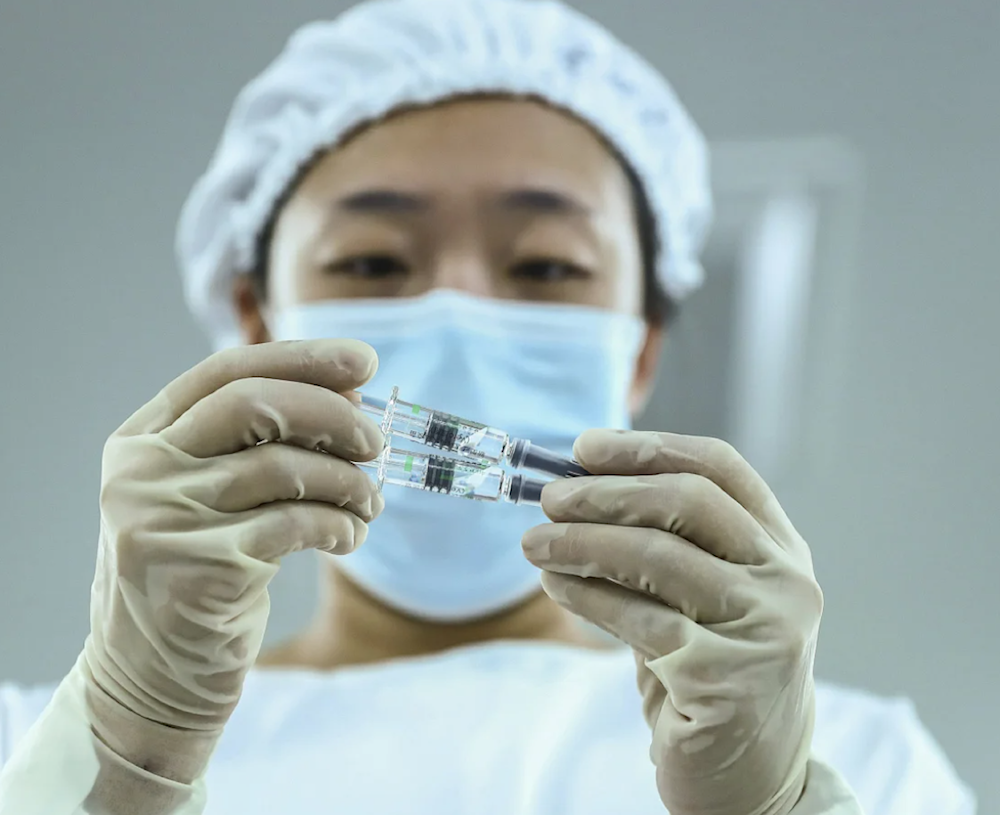China's Sinovac hits back at US military campaign discrediting vaccine
The Chinese pharmaceutical company warns that the Pentagon's social media onslaught on its coronavirus vaccines might lead to an "enormous disaster"
-

In this December 25, 2020 photo released by Xinhua News Agency, a staff member inspects syringes of COVID-19 inactivated vaccine products at the packaging plant of the Beijing Biological Products Institute Co. Ltd, a unit of state-owned Sinopharm in Beijing. (AP)
Sinovac, a Chinese biopharmaceutical company, has hit back following a report that the US military operated a secret anti-vax drive during the Covid-19 crisis to discredit China's vaccine, describing the campaign by the Pentagon as an attack that will "create enormous disaster," South China Morning Post reported.
An investigation published by Reuters on Friday revealed that during the COVID-19 pandemic, the US military conducted a secret campaign to counter China's growing influence in the Philippines by spreading doubt about Chinese-provided aid, including vaccines.
This covert operation involved multiple ways of disseminating anti-vaccine propaganda, particularly targeting China's Sinovac inoculation.
For instance, the Pentagon created numerous fake social media accounts on platforms like X (formerly Twitter), Facebook, and Instagram. These accounts were used to spread anti-vaccine propaganda, often targeting specific audiences in Southeast Asia and beyond.
The campaign also focused on spreading doubt about the safety and efficacy of Chinese vaccines, such as Sinovac. This included false claims about the presence of pork gelatin in the vaccines, which could be considered forbidden under Islamic law, thus affecting Muslim-majority countries.
The propaganda aimed to intensify fears and anger toward China's vaccines by exploiting existing suspicions and grievances against the country, such as its territorial disputes in the South China Sea.
The campaign also capitalized on existing geopolitical tensions and rivalries between the US and China by leveraging the strained relationship between the US and the Philippines, as well as broader regional dynamics in Southeast Asia, to advance US interests and undermine China's influence.
Despite objections from diplomats and warnings from social media companies, the campaign continued until mid-2021.
Yuan Youwei, a spokesperson for Sinovac, expressed that this stigmatizing will lead to a "lower inoculation rate, the outbreak and spread of disease, social panic and insecurity, as well as crises of confidence in science and public health."
She stated that Sinovac's corporate mission is to create vaccinations capable of eradicating viruses and improving human health.
"Currently we have overcome Covid, but the world is still not in peace," Yuan stated. “Sinovac will continue to help people live good and prosperous lives by preventing disease. We reckon that each profession should focus on their specialties, which is the right attitude.”
Edward Snowden, the American whistleblower famed for uncovering his country's surveillance and intelligence-collecting techniques, commented on his own X account that the US misinformation effort "is going to be taught in history classes."
This is going to be taught in history classes.
— Edward Snowden (@Snowden) June 14, 2024
Former Philippine President Rodrigo Duterte got his first dose of another Chinese vaccine, the Sinopharm Covid-19, in May of 2021, after which he reported feeling "good" and cited that collaboration with Beijing helped "manifest the friendship between both countries."
To assist the Philippines with recovery from the epidemic, the country received a further shipment of Sinovac in December 2021.
According to Lu Xiang, a research fellow at the Chinese Academy of Social Sciences, the US would continue to utilize sophisticated operations to distribute "disinformation" that aims to undermine an adversary's reputation and integrity by fabricating information.
"The US chooses geopolitics over public health," he stated. "Whether the Democrats or Republicans, they will both do the same."
Lu noted that during the campaign, the US "wasn't happy with Duterte's good relationship with China."
According to Wang Zichen, a research fellow at the Beijing-based Centre for China and Globalisation think tank, the campaign indicates a zero-sum attitude.
Washington considered China's provision of life-saving vaccinations to other poor countries, which had been overlooked by the Trump administration's "America First" policy, as being damaging to US interests, he claimed.
“A more constructive approach should have been for the US to respond to China’s provision of a global public good by contributing more to the Global South in public health and other domains such as infrastructure," citing that there could be "positive outcomes" from competition between both countries.
Tao Lina, a Shanghai-based vaccine researcher, stated that US attempts to discredit Chinese vaccines failed to cause significant damage because China remained one of the countries with the highest immunization rates.
Meanwhile, the US actions will suffer "a big blow" to its own image, Tao noted.

 4 Min Read
4 Min Read








